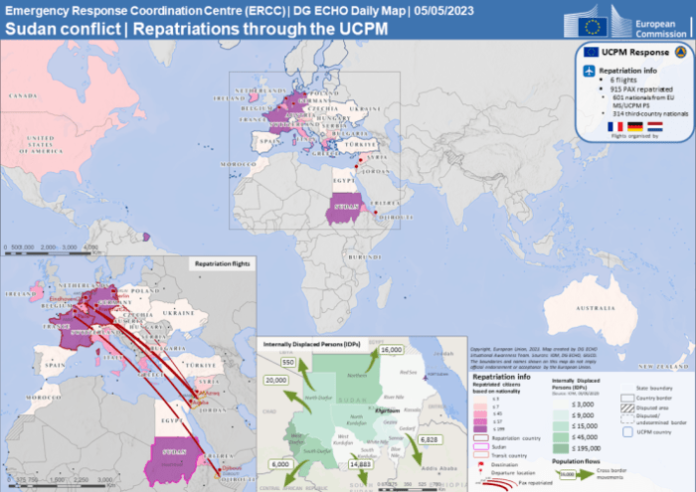In April 2023, violent armed clashes erupted in Sudan’s capital city, Khartoum, between the Sudanese Armed Forces (SAF) and the Rapid Support Forces (RSF), exacerbating the suffering of millions already affected by drought, natural disasters, and displacement. Sudanese citizens and refugees have found themselves uprooted by the conflict, while humanitarian organizations faced casualties and looting of their supplies.
The EU’s Civil Protection and Humanitarian Aid Operations has stepped up its humanitarian assistance to help those most in need, implementing several measures:
- Humanitarian Air Bridge: the EU established a Humanitarian Air Bridge to transport essential supplies, such as water, sanitation, hygiene, and shelter equipment, from the United Nations warehouses in Dubai to Port Sudan. The initiative is part of the European Humanitarian Response Capacity and is expected to involve additional flights.
- Emergency Assistance: the European Commission allocated €73 million in humanitarian aid for Sudan. It is collaborating with humanitarian partners to adapt existing programs to address the new situation. EU funding supported the Sudanese Red Crescent Society with first aid, evacuation services, and psychosocial support, helping around 70,000 people in Khartoum and other affected areas. Emergency support was extended to the Egyptian Red Crescent, Ethiopian, and South Sudan Red Cross Societies, in support of Sudanese refugees.

- Deployment of EU Experts: EU humanitarian experts were rapidly deployed to Sudan’s border crossing points, working alongside partners to assess the situation of refugees and returnees.
- EU Civil Protection Mechanism: the EU Civil Protection Mechanism was activated, leading to the repatriation of 769 individuals through EU-funded evacuation flights organized by Germany, the Netherlands, and France. This included citizens from EU Member States, participating states, and third-country nationals.
- Advocacy for Humanitarian Access: EU officials, including Commissioner for Crisis Management Janez Lenarčič and High Representative/Vice President Josep Borrell, emphasized the importance of respecting international humanitarian law. They called for unimpeded access for humanitarian actors to deliver life-saving assistance and condemned the killing of humanitarian aid workers.
Throughout the crisis, the EU has demonstrated a commitment to addressing the urgent needs of affected populations in Sudan. By providing essential supplies, allocating funding, deploying experts, facilitating evacuations, and advocating for humanitarian access, the EU is working with partners to alleviate the suffering caused by the conflict and support those most in need.
Additional links:
- UNRIC Backgrounder: Sudan
- EU’s Civil Protection and Humanitarian Aid Operations
- Original article: Humanitarian crisis in Sudan: 5 ways the EU is helping




